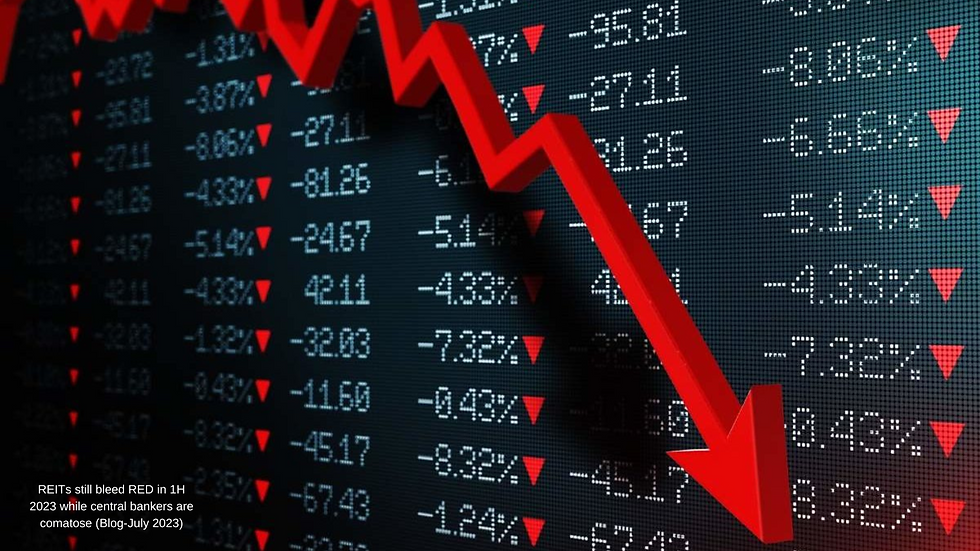ARE THE BOND MARKETS WARNING THE EQUITY BULLS?
- by Gabriel Yap

- Nov 18, 2017
- 3 min read
07/2014-
Stock indexes continued to flirt with new highs last month – the Dow skirted with the 17,000 mark while the S&P500 continually fell short of 50 points from the 2,000 mark. Meanwhile, the local FTSTI surged pass 3,300 points despite many “Sell in May and Go Away” warnings from many analysts.

The bond market is indeed behaving quite differently, just like the local weather which switches between days of really “peng kang” hot perspiration days with temperatures hitting 35 degrees alternating almost back-to-back with days of rain-on-end.
The abnormal bond market trend has been digging in globally – demand for bonds have pushed up prices which in turn has pushed down yields from Tokyo to London, from Frankfurt to New York.
This is certainly disconcerting as the economy is rebounding after 1Q2014 from bad winters previously. The logic is that better growth should stimulate demand for money, pushing interest rates and therefore bond yields up, not lower, a scenario that is currently being played out in the global bonds market.
Falling yields have unsettled the investment world causing huge losses who had loaded up on bonds previously. But more disconcerting is that it breeds the growing concerns among the smarter investors is – Is the global economy not recovering as strong as earlier expected? Have the various Quantitative Easing , QE measures not achieved their targets?
Falling bond yields also pose big challenges for Central Banks (CBs) like the Federal Reserve and the ECB. These CBs rely on falling bond yields to drive their respective monetary policies, especially now that the CBs are cutting back on their QE measures. If indeed, global growth turns out to be weak, then the intensive-care QE measures may have to be re-introduced by the CBs in the coming months. Already, the ECB has taken the unprecedented step of lowing inter-bank funds to -0.1% in June 2014.
Is the world economy considerably weaker than it is generally believed to be?
Of course, the half-glass full optimistic view of the current bond yield conundrum is that it is due to a combination of special circumstances –
Trade and GDP slowdowns in China and Japan, both the 2nd and 3rd largest economies respectively have pushed their currencies down so that investors have flocked to the US and Europe which in-turn pushed down the bond yields.
An asset-allocation shift from equity and pension fund managers to bonds after a great year for equities in 2013.
A shortage of AAA-rated longer duration bonds which has also led to a levelling off in longer-dated maturities.
So what has this peculiar low bond-yield environment breed?
It has encouraged many money and pension managers to invest in
Once unloved markets within the EU like Portugal, Italy, Greece and Spain. Ironically, these countries were unfamously termed as PIGS during the Global Financial Crisis (GFC) in 2008 as it was the debt default from Greece that triggered the GFC in the summer of 2008. Greece bond yield has now come down to 6.13% compared to 11.4% last summer while Spain’s bond yield currently yields 2.85% compared to 5.10% last summer. This means bond prices of the PIGS have almost soared 50% !!
Real estate investment trusts or REITS and high-yield Business Trusts. For example, the local REITS have enjoyed a nice 10% gain since the start of the year, not including their dividend payouts which average 6% currently.
So where do we stand?
Are we headed to a scenario where the US 30-year bond yield will fall below 3% and the benchmark 10-year bond yield go below 2%? Both are trading at 3.31% and 2.6% presently. The latest GDP growth of -1% for 1Q2014 certainly reinforce this concern.
If the above plays out, then global investors will definitely get more aggressive going more into unloved regions, possibly the Fragile 5 countries comprising Indonesia, India, Turkey, South Africa and Brazil who is hosting the current FIFA World Cup, and definitely hopeful of raising tourism receipts.
If not, then the current low yield environment is probably temporal and the smart investor must certainly make hay while the samba plays.




Comments